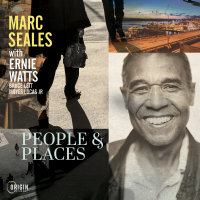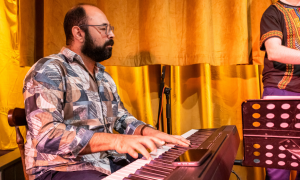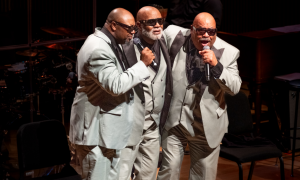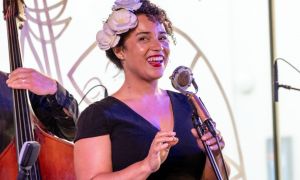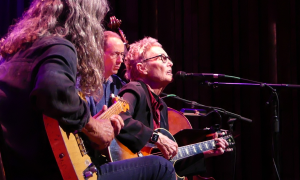Home » Jazz Articles » Live Review » 4th Zbigniew Seifert International Jazz Violin Competition
4th Zbigniew Seifert International Jazz Violin Competition

Black lives matter, black artists matter. The history of jazz would not exist without black men and black womenĪŁ
—Greg Byers, winner of the Journalists' Jury Award 2020
Cricoteka Museum, Krak©«w, Poland/Various international locations on-line
July 8-10, 2020
When the fanfare and drum roll had died down the big moment arrived. After three days of on-line competition, the six finalists waited anxiously in front of their screens, in Israel, The USA, Austria, France and in Brazil, to hear who would be crowned the winner of the 4th Zbigniew Seifert International Jazz Violin Competition. Ten thousand Euros and the prestige of coming out on top of an initial field of over forty entrants were at stake—a potentially pivotal moment in a musician's career. The job of announcing the winner was left to the competition's MC, Piotr Metz, who had conducted proceedings in the Krak©«w studio with warm professionalism from the competition's start. And, without raising an eyebrow, he announced that there would be no winner this year. There were two third places and two second places, but no first place.
There have been music competitions in the past where two musicians have shared first prize, when it has been simply impossible to separate two outstanding contestants. Such cases have occurred in the world of classical music, sometimes with psychodramas worthy of a film. But in the case of the 4th Zbigniew Seifert International Jazz Violin Competition, judges

Miroslav Vitous
bassb.1947

Michal Urbaniak
violin
Ernst Reijseger
cellob.1954
It was a confusing and, in many ways, an unsatisfactory result, and one that will possibly leave a bitter taste in the mouths of some of the participating musicians.
Background
The Seifert Competition, as it is more commonly and economically referred to, was founded with the principal aims of promoting the legacy of the great Polish jazz violinist
Zbigniew Seifert
violin1946 - 1979

Tomasz Sta©Įko
trumpet1942 - 2018
When Sta©Įko's quintet dissolved, Seifert began a brief but brilliant solo career that was sadly truncated when cancer claimed him in 1979, at the age of thirty-two. Still, over forty years later, not all of Seifert's handful of LPs have been reissued on CD, and he remains, to some degree, one of jazz's lesser known geniuses.
Yet Seifert is gradually emerging from his underground, cult status into the international spotlight.
In 2009, on the thirtieth anniversary of Seifert's passing, the violinist was celebrated in the three-day, Zbigniew Seifert in Memoriam festival, which was held in Seifert's hometown of Krak©«w. In 2010, Aneta Norek-Skrycka and Prof. Janusz M. Stefa©Įski co-founded the Zbigniew Seifert Foundation, whose aim is to promote jazz and, naturally, Seifert's legacy.
The Krzysztof Penderecki European Centre for Music, in Lus?awice, Poland, staged the 1st Zbigniew Seifert International Jazz Violin Competition in 2014, and has been home to the competition every two years since then. The global COVID-19 pandemic threatened cancellation of the event in 2020, but unbowed, the organizers took the bold decision to hold the competition on-line.
Blindfold auditions were held, and from over forty applicants, twelve violinists and two cellists were selected for the semifinals. Each musician had to perform three pieces, including one compulsory Seifert tune. Given the exceptional circumstances of this year's competition, contestants were able to submit pre-recorded videos, although at least one piece had to be performed live to camera. All the performances were broadcast live on YouTube, with distinguished guests in the studio offering insights into Seifert life, his music and legacy.
For the first time in the competition's history, a Journalists' Jury presented an award to its choice as outright winner. The jury consisted of the author (All About Jazz), Anne Yven (Citizen Jazz), Pawe? Brodowski (Jazz Forum), Mary James (London Jazz News) and Martin Laurenthius (Jazz Thing).
Day One: The First Semi-Final
John Pearse
First up was John Pearse (England), who, backed by double bassist " data-original-title="" title="">William Harris, pianistDavid Newton
pianob.1958

Fats Waller
piano1904 - 1943

Stephane Grappelli
violin1908 - 1997

Joe Pass
guitar1929 - 1994
Youenn Rohaut
Already a prize winner for improvisation at the 2013 St©”phane Grappelli competition, and making his second appearance at the Seifert competition, French violinistYouenn Rohaut
violin
John Coltrane
saxophone1926 - 1967
Dawid Czernik
Hailing from Poronin in the Tatra Mountains,
Dawid Czernik
violin
Charlie Haden
bass, acoustic1937 - 2014
Dominic Ingham
Playing to a backing track (vibraphone, piano, bass and drums), UK violinist
Dominic Ingham
violinJo?o Silva
Barcelona-based Portuguese violinist
João Silva
violinOmer Oshano
New York-based Israeli violinist Omer Oshano presented two video recordings of original compositions, lent support by
Yoav Eshed
guitar
Ofri Nehemya
drumsb.1994
Greg Byers
American cellist
Greg Byers
cello
Charles Mingus
bass, acoustic1922 - 1979
Day Two: The Second Semi-Final
Kristjan Rudanovski
Estonian violinistKristjan Rudanovski
violin
Sonny Rollins
saxophoneb.1930

Django Reinhardt
guitar1910 - 1953
Over Rudanovski's shoulder, outside the dining room window, a small group of kids were jumping up and down and waving to camera during his performance. It was symbolic of the strangely hermetic existence enforced upon us by COVID-19, and a reminder of the ongoing isolation of musicians.
Cl©”ment Janinet
French violinistClément Janinet
violinTadas De?ukas
A home sauna provided excellent acoustics for the solo violin of Lithuanian violinistTadas Dešukas
violinJohannes Dickbauer
Austrian
Johannes Dickbauer
violinSebastian Schneider
pianob.1995
András Dés
drumsGabriel Vieira
Brazilian violinistGabriel Vieira
violinRafael Calegari
bass, electric
Nana Vasconcelos
percussion1944 - 2016
Kristjan Krajn?an
Cellist, drummer, composer and film maker, Kristjan Krajn?an, is a multi-faceted artist. The Slovenian fused his twin passions of cello and percussion in an entirely live performance. On "Floating Sand," Krajn?an employed a host of effects; pedals; amplification; a drumstick on his strings; an Indian, table-esque rhythm rapped on his cello's body; prayer cymbals; melodic bow. It was a fascinating performance from a fertile imagination. Seifert's "Way to Oasis" invited more conventional bowing from Krajn?an, but the interpretation, in line with his performance as a whole, was an extremely personal one, utilizing pedals to conjure other-worldly textures. The original tune "The Leaving of Siddhartha," with its propulsive rhythms and the cellist's mesmerizing melodic lines, closed the performance on a high note.Gabriel Terracciano
Portland, Maine-raised but New York-based, " data-original-title="" title="">Gabriel Dowdy-Terracciano was returning to the Seifert competition, having won third place in the 2018 edition. With Michael Beling on organ and Gary Gemmiti on drums, Terracciano opened with a snappy version of
George Shearing
piano1919 - 2011

Duke Ellington
piano1899 - 1974
Day Three: The Final
Six musicians advanced to the final: Omer Oshano; Youenn Rohaut; Gabriel Vieira; Johannes Dickbauer; Greg Byers; and Cl©”ment Janinet. It was another chance for the three judges to assess the musicians' respective qualities. It should be stated that the Journalists' Jury, acting independently of the judges throughout the three days, had made their decision on the competition's winner after the semi-final stages. The reason for this was because one of its top four choices after the semi-finals did not make the final, and the jury was committed to its original criteria.Omer Ashano
Omer Ashano's deft arrangement of the Walter Gross/Jack Lawrence ballad "Tenderly" proved the power of subtle playing to bewitch. There was no show of flamboyancy, but the interplay between the violinist and Yoav Eshed on guitar conjured transfixing textures. Cantering African rhythms and bright melodies colored "Tigrinya Lullaby," one of the most memorable original tunes of the competition. From gentle beginnings Oshano gradually gathered wind in his sails, before trading back and forth with the impressive Eshed. For his live tune, played to a backing track of his quartet, Oshano turned to Seifert's "Man of the Light." His elegant bowing and smooth phrasing belied the bite in his attack. A fine performance.Back in the studio, MC Piotr Metz gave the first hint that the judges were preparing to spring a surprise when he announced: "Important information; the judges reserve the right to different allocation of awards and prizes. But we'll let you know."
Youenn Rohaut
Youenn Rohaut opened with
Don Grolnick
piano1947 - 1996
Gabriel Vieira
Leading the same quartet as for the semi-final, Vieira chose to start with Seifert's "Turbulent Plover," leading with a refined, neo-classical intro. Calegari's fast-walking bass was at the heart of the quartet's drive, propelling Vieira to his most adventurous solo of the competition. For the live segment, and to a backing track, Vieira returned to m©▓sica popular brasileira with Alegre Corr©║a's breezy "Cunha Ta A©¬." Vieira's wordless singing in unison with the uplifting melody was seductive, but as beautiful as it was, this tune seemed a vehicle of limited scope in the wider context. Beb©║ Kramer's "Como Manda o Figurino" followed a similar template, though its much livelier tempo asked more of Vieira. His precision and agility were plain to see, as was the joy in his endeavor.Johannes Dickbauer
Once again, Johannes Dickbauer backed himself with two original tunes. The pre-recorded "Race Against 1.5" afforded generous space to pianist Sebastian Schneider, and to percussionist Andr©ós D©”s—over a vamp— but it was the violinist's smooth legato lines, not without pleasingly stormy rushes, that dominated. Live, exquisite pizzicato bookended "Quo Vadis"; Dickbauer's singular deconstruction of this Seifert classic invited some of the Austrian violinist's most arresting playing, with a vocabulary perhaps leaning as much towards classical as jazz, but marked by an unmistakable spirit of adventure, nevertheless. The second original number, "Breaking Isolation," seamlessly fused chamber, folk and jazz aesthetics, a hybridity reflected in Dickbauer's free-flowing solo.The day before the video recording Dickbauer was stung by one of the bees he keeps, swelling and closing one of his eyes. Luckily, a quick dose of antihistamine did the trick. Even the bee, it seems, knew that Dickbauer had one eye on the top prize.
Greg Byers
A Minneapolis rooftop provided the setting for Greg Byers' recorded interpretation of Seifert's "Song for Christopher." Another cleverly edited production featured a total of five Greg Byers, backed by a tape of
Javier Santiago
piano
Lawrence Buckner
bassCl©”ment Janinet
Free of the technical issues of his semi-final appearance, Cl©”ment Janinet delivered a captivating set, backed for the two live pieces by Clement Petit on cello, and Hugues Mayot on clarinet. Unaccompanied, Janinet explored the wide sonic possibilities of the violin, conjuring Asian, African and classical sonorities on the aptly named "Schyzoph©”nic." The three instruments combined beautifully on Seifert's "Kilimanjaro," with Janinet switching between plucked Malian motifs and devilishly intricate bowed pyrotechnics. Dark rhythmic contours underpinned Janinet's dashing improvisation on "Valse," with Petit's measured response closing the piece on a note of reverie. The studio recording, "Mauvais Temps," teamed Janinet with Bruno Ducret on cello, and " data-original-title="" title="">Elodie Pasquier on clarinet; a showcase for the violinist's ever- musical virtuosity, this elegantly flowing chamber arrangement provided further evidence of Janinet's compositional flair.The Results
The first winner of the evening was announced by Piotr Iwicki of the Association of Performers of Music and Music with Lyrics (SWAP), Holding an outsized cheque to the value of 1000 Euros, Mr. Iwicki announced Dawid Czernik as the Best Polish Participant of the competition. Who could argue with that? Czernik, of course, was the only Polish participant in this edition. Czernik was the recipient of another special award, a concert organized by the Krzysztof Penderecki Music Centre in Lus?awice. With his debut solo album due for release before the end of 2020, we can expect to hear a lot more from this talented violinist.The Journalists' Jury Award for the Best Violinist in this year's competition was announced by Anne Yven of Citizen Jazz magazine. Yven stressed that this jury operated under its own criteria, independently from the three main judges. She explained how the jury selected two musicians from each semi-final, before making a final vote. The four finalists were: Dawid Czernik; Greg Byers; Johannes Dickbauer; and Gabriel Vieira. The winner of the Journalists' Jury Award, collecting a cheque for 1000 Euros, was Greg Byers.
In his acceptance speech, Byers thanked his parents for their life-long support, as well as his sponsors. He made the point of acknowledging the turmoil afflicting American society today: "Black lives matter, black artists matter," Byers said. "The history of jazz would not exist without black men and black women..." Byers extended his thanks to the other competitors and, with what will have been music to the organizers' ears, to the Seifert competition, added: "I don't think I would be the musician I am today without this competition pushing me to grow," he graciously acknowledged.
The Audience Award for the Best Violinist, sponsored by the Zbigniew Seifert Foundation, went to Gabriel Vieira, whose performances proved to be extremely popular with the on-line viewers. In his acceptance speech, Vieira thank his family for its support, and his production team for all its hard work.
An additional award of 1,500 Euros, courtesy once again of the Zbigniew Seifert Foundation, and recognizing Artistic Merit, went to Kristjan Krajn?an. It was the second piece of good news for Krajn?an that day, having earlier been selected as a screen writer for an upcoming film.
Then, MC, Piotr Metz announced the judges' bombshell. Without further explanation, the two third prizes, each of 2000 Euros, were awarded to Omer Ashano and Cl©”ment Janinet.
The second-place prizes, each of 5000 Euros, went to Youenn Rohaut and Johannes Dickbauer. It would have been interesting to know how they felt about the allocation of prizes, and their experiences of this year's Seifert competition, but the only question they were asked was about their respective plans for the rest of the year. For Rohaut, composing music, and for Johannes, installing a kitchen. And that was that. The script, so enthralling for three days, deserved a better ending.
Wrap-up
That the 4th Zbigniew Seifert International Jazz Violin Competition went ahead at all is testament to the determination of the organizers not to surrender to COVID 19. That would have been the easy option, and nobody would have blamed the Seifert Foundation had it taken such a decision. In this noble act of resistance, in this refusal to give up when the going was tough, there was the fighting spirt of Zbigniew Seifert. Even when the cancer had sapped his strength, Seifert refused to give up, and continued to make music up until the last possible moment. For running the competition online, and for doing so with such professionalism, Aneta Norek-Skrycka and the Seifert competition team deserve great credit.With fourteen musicians from eleven countries in different time-zones, the potential for technical cockups was great, but the production team in the Cricoteka Museum, Krak©«w, did a first-rate job. Not only does Zbigniew Seifert's reputation continue to grow thanks to the ongoing efforts of the Seifert Foundation and its flag-bearing competition, but once again a new raft of outstanding musicians has become known to a much wider, international audience. These have been the dual aims of the competition since its inception in 2014, and for these reasons alone it is to be hoped that many more editions of the competition lie ahead.
As COVID-19 has so dramatically demonstrated, however, nothing in life can be taken for granted. It would not take too many more 'no first prize' decisions like the one made by the judges this year, for the credibility of the Zbigniew Seifert International Jazz Violin Competition to suffer.
One wonders how many violinists, violists or cellists, from far-flung corners of the world, were watching this year's competition online, dreaming of participating in 2022 or beyond. What might they have thought of the judges' decision not to crown an outright winner? Is a musician in Cape Town, Buenos Aires, Sydney, San Francisco or Beijing going to pay a considerable sum to fly to Poland and compete for the chance to win If they thought there was the possibility that this might happen again?
If the judges considered that Youenn Rohaut and Johannes Dickbauer were the two outstanding contestants, then should they not have awarded them joint first place? Would that not have been the fairest and most logical conclusion? Not to award first prize felt akin to saying that there was no-one worthy of the first prize. At best, it seems like an error of judgment. After three days of brilliant competition, the result was deflating.
When decisions are as difficult to understand as they were, perhaps, to make, resulting in confusion and disappointment, do the judges not bear a certain responsibility to explain their thought process? In the vacuum of such a scenario people will naturally draw their own conclusions.
Perhaps B©”la Bart©«k had it right, as the worthy 2016 Seifert competition winner

Mateusz Smoczy©Įski
violinb.1984
Photo: Courtesy of Sophiea Owen
Tags
Comments
PREVIOUS / NEXT
Support All About Jazz
 All About Jazz has been a pillar of jazz since 1995, championing it as an art form and, more importantly, supporting the musicians who make it. Our enduring commitment has made "AAJ" one of the most culturally important websites of its kind, read by hundreds of thousands of fans, musicians and industry figures every month.
All About Jazz has been a pillar of jazz since 1995, championing it as an art form and, more importantly, supporting the musicians who make it. Our enduring commitment has made "AAJ" one of the most culturally important websites of its kind, read by hundreds of thousands of fans, musicians and industry figures every month.
Go Ad Free!
To maintain our platform while developing new means to foster jazz discovery and connectivity, we need your help. You can become a sustaining member for as little as $20 and in return, we'll immediately hide those pesky ads plus provide access to future articles for a full year. This winning combination vastly improves your AAJ experience and allow us to vigorously build on the pioneering work we first started in 1995. So enjoy an ad-free AAJ experience and help us remain a positive beacon for jazz by making a donation today.

Krakow
Concert Guide | Venue Guide | Local Businesses
| More...
Krakow Concerts
Sep
15
Mon
Ma?ek IQ Project
Globus Music Club
Krak©«w, Poland
Sep
16
Tue
Ma?ek IQ Project
Globus Music Club
Krak©«w, Poland
Sep
18
Thu
6. Konkurs Gitarowy im. Jarka ?mietany: Common Ground
Harris Piano Jazz Bar
Krakow, Poland
Sep
20
Sat
Koncert Laureatów i Gwiazd 6. Konkursu Gitarowego...
Filharmonia Im. Karola Szymanowskiego
Krak©«w, Poland
Sep
26
Fri
Old Metropolitan Band
Globus Music Club
Krak©«w, Poland
Sep
27
Sat
Chuck Frazier Trio
Globus Music Club
Krak©«w, Poland
Oct
14
Tue

Rachel Eckroth Trio
Nospr
Katowice, Poland
Oct
15
Wed
Kovacs
Klub Studio
Krak©«w, Poland
Oct
16
Thu

Diana Krall
House Of Music And Dance
Zabrze, Poland
Oct
17
Fri

Chris Botti
National Polish Radio Symphony Orchestra
Katowice, Poland

Krakow
Concert Guide | Venue Guide | Local Businesses | More...Ma?ek IQ Project
Globus Music ClubKrak©«w, Poland
Ma?ek IQ Project
Globus Music ClubKrak©«w, Poland
6. Konkurs Gitarowy im. Jarka ?mietany: Common Ground
Harris Piano Jazz BarKrakow, Poland
Koncert Laureatów i Gwiazd 6. Konkursu Gitarowego...
Filharmonia Im. Karola SzymanowskiegoKrak©«w, Poland
Old Metropolitan Band
Globus Music ClubKrak©«w, Poland
Chuck Frazier Trio
Globus Music ClubKrak©«w, Poland

Rachel Eckroth Trio
NosprKatowice, Poland
Kovacs
Klub StudioKrak©«w, Poland

Diana Krall
House Of Music And DanceZabrze, Poland

Chris Botti
National Polish Radio Symphony OrchestraKatowice, Poland







 Buy Now
Buy Now



